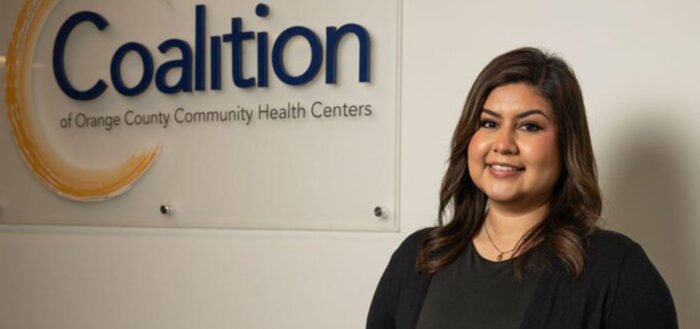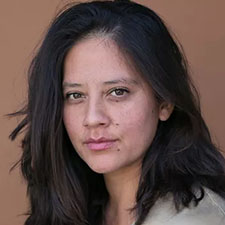|
Getting your Trinity Audio player ready…
|

By the time Martin Martinez, 57, met with health care navigator Isabel Inzunza at a low-cost health clinic in the city of Orange, California, he was in despair.
Martinez injured his knee in 2006 while working on a farm. He had hoped it would heal on its own, but instead, the injury worsened steadily. His leg became permanently bent outward, fluid oozed out of his knee joint, and the cartilage in his knees wore away to the point that his bones grated against each other and made a cracking sound when he walked. Unable to afford to see a doctor, Martinez tried to push through the discomfort by swallowing painkillers and using a cane. Now, the pain was so excruciating, he could barely get out of bed.
For many years, Martinez’s undocumented status disqualified him from Medi-Cal, California’s safety-net health insurance program. His wages as a carpenter’s assistant were too low to cover the costs of care, but the unbearable pain in his knee also forced him to take unpaid days off work each week. Martinez struggled to afford rent and food. Without help, he didn’t know how he would keep going.
“It was a really ugly situation,” he said in Spanish. “But thankfully, God doesn’t abandon us, and he put Mrs. Isabel [Inzunza] in my path.”
Over the years, the state has steadily removed immigration status as a barrier to enrolling in full-scope Medi-Cal. As of January, the program was opened to all Californians with low incomes, meaning no one will be denied coverage because they are undocumented. During these policy shifts, navigators have played a critical role in helping people like Martinez obtain health insurance coverage. Inzunza is one of at least 1,200 community health care navigators working at community health clinics and community-based organizations across the state to enroll people in Medi-Cal and other government programs.
Navigators Can Step In
Many people newly eligible for Medi-Cal don’t realize they qualify or don’t know how to sign up. Immigration laws, particularly the now-overturned “public charge” rule of the Trump presidency, have made some people afraid to enroll in Medi-Cal because they’re worried about disclosing their immigration status on a government form. Others fear it could hurt their chances of obtaining legal residency (it doesn’t). Language, literacy, and other barriers can also make it difficult for some people to understand enrollment requirements. As a result, they may get erroneously denied coverage, miss key notifications in the mail, or be unaware of how to use and keep benefits they have. In any of these situations, navigators can step in.
“We assist members through the entire [health insurance enrollment] process, from the start of the application to utilizing their coverage and making sure they retain it,” said Stephanie Hernandez, program manager of health care operations at the Coalition of Orange County Community Health Centers. The Coalition OC supports navigation and other services at multiple enrollment sites throughout Orange County, including its 26 member health centers operating over 80 sites.
In addition to connecting folks to Medi-Cal, navigators help people enroll in CalFresh, formerly known as food stamps, and CalWORKs, which is cash aid, through the Benefits Cal portal. They can connect them to community resources that they might need, such as legal aid. The Coalition OC navigators are also certified enrollment counselors who can assist in enrolling people in plans under the state’s health insurance marketplace, Covered California. Once clients receive health insurance, navigators can help them select a primary care doctor, make medical appointments, and complete insurance renewal packets.
While navigators assist anyone who needs their services, they work hard to reach people most likely to fall through the enrollment cracks. These include immigrants, people with limited English proficiency, workers with low wages, young people of color, people experiencing homelessness, people with disabilities, and older adults. Often, they’ll travel to places such as family resource centers, schools, and libraries to do outreach and enrollment work. Navigators spend as much time with clients as needed, explaining health insurance options and answering questions, either in person or over the phone, Hernandez said. Services are free.
A Life-Changing Envelope
Martinez found out about the coalition’s health care navigation services after he sought help at one of the organization’s member clinics, La Amistad Health Center. There, he was able to see a primary care doctor, but couldn’t get the care he needed from an orthopedic specialist or surgeon because he didn’t have health insurance. A staff member gave him a card with Inzunza’s number on it. He called.
They met at the clinic in December. Prior to the appointment, Inzunza instructed Martinez — as she does with all her clients — on what documents to bring: a photo ID, proof of income, and proof of address. Over the course of an hour, she patiently asked him questions in Spanish and filled out the application form. After it was submitted, she told him what to expect.
Martinez remembers how excited he felt when, a few weeks later, he received a large envelope in the mail from CalOptima, the organization that oversees Medi-Cal in Orange County. It was exactly what Inzunza had told him to look out for. He called her immediately.
“That’s great,” she said. “That means they accepted you.”
Relief swept over him.
“Imagine the enormous surprise, the joy after so much struggle,” he said. “Finally, I’d made it.”
Serving Their Own Community
Because navigators typically come from the communities they serve and understand the backgrounds and languages of the people they’re helping, they can more easily build trust with clients and put them at ease, Hernandez said. They’re familiar with the fears and frustrations those in their communities commonly experience when trying to access health care. Frequently, clients will return to a navigator for help with health insurance issues year after year.
“Having the passion and the heart when it comes to being a health care navigator is extremely important,” Hernandez said. Navigators “feel personally connected to the people they’re serving.”
For Hernandez, becoming a navigator and certified enrollment counselor in 2013 felt like a calling. As a child growing up in an immigrant family in Santa Ana, she had to translate medical forms and letters into Spanish for her parents and accompany them to doctor’s appointments as their interpreter. She remembers her parents struggling to obtain health insurance and facing discrimination. The clients she works with now confront similar difficulties, and she tries to treat them as she would her own parents, she said.
“It doesn’t matter if you’re documented or undocumented,” she said, describing her approach. “You deserve to be treated fairly and you deserve to have the help that you need.”
Hernandez said her team members do their best to reassure clients by hosting workshops with immigration attorneys who can answer people’s legal questions.
In other instances, undocumented clients earn too much to qualify for Medi-Cal, but because of their legal status can’t get subsidized health insurance through Covered California. Navigators work with these clients to identify low-cost clinics and, if available, health plan options they can use.
However, because California faced a huge budget deficit in 2024-2025, state funding for navigators has been reduced. Without continued support for the profession, Hernandez worries more people will miss out on life-changing health insurance coverage and that immigrant parents will again ask their children for help filling out insurance forms instead of seeking assistance from trained professionals.
After receiving Medi-Cal coverage, Martinez was able to meet with an orthopedic surgeon. On January 16, he underwent a full knee joint replacement. Soon after, he began receiving physical therapy. His life is transformed, he said. Now, he’s walking comfortably, his leg is straight, and he’s pain free. He’s able to work and pay his bills again.
“I walk slowly, but I’m getting there,” Martinez said. “If it wasn’t for Medi-Cal, who knows what would have happened.”
Authors & Contributors

Claudia Boyd-Barrett
Claudia Boyd-Barrett is a longtime journalist based in Southern California. She writes regularly about health and social inequities. Her stories have appeared in the Los Angeles Times, San Francisco Chronicle, San Diego Union-Tribune, and California Health Report, among others.
Boyd-Barrett is a two-time USC Annenberg Center for Health Journalism fellow and a former Inter American Press Association fellow.

Zaydee Sanchez
Zaydee Sanchez is a Mexican-American visual storyteller, documentary photographer, and writer. Inspired by her upbringing in Tulare, in California’s agricultural San Joaquin Valley, her work is rooted in addressing the complexities of migration. With a focus on workers, gender, and displacement, she seeks to tell impactful, meaningful stories. Her work has been published in Al Jazeera, NPR, High Country News, palabra and more.
Her exhibition, “Tell Our Truth”, documented the stories of migrants seeking asylum during the Trump administration. The exhibition toured Los Angeles public libraries for a year, bringing discussions to various neighborhoods around the county. In 2019, the Commission on the Status of Women honored Zaydee as one of the Pioneer Women of the Year for her devotion to documenting and highlighting the Skid Row community in Los Angeles.

Kyusung Gong
Kyusung Gong is an independent photojournalist based in Los Angeles and the Orange County area. He is a former staff photographer at the Orange County Register. He is working on an MFA degree in photography at the Academy of Art University and is a journalism lecturer at Cal State Long Beach.



